![]() Carleton University is committed to protecting and enhancing the ecosystems and green spaces that the university owns, manages, or impacts, in order to improve biodiversity and support a landscape that can respond to future climate change.
Carleton University is committed to protecting and enhancing the ecosystems and green spaces that the university owns, manages, or impacts, in order to improve biodiversity and support a landscape that can respond to future climate change.
The Carleton Campus is fortunate to be located in a very natural and green setting, bordered by the Rideau Canal and Rideau River. Students have long identified it as one of the most remarkable parts of the Carleton experience.
Biodiversity on Campus
Campus Operations
Carleton University’s land use and management of the 62-hectare campus impacts the local ecosystem through the use of water, campus development and construction, landscaping applications (such as fertilizers in the summer or salt in the winter), and stormwater management. The university has a policy for integrated pest management and has not used chemical pesticides on the grounds for at least five years.
Biodiversity Assessment
Outdoor Space Master Plan
Carleton University’s Outdoor Space Master Plan (OSMP), completed in October 2020, provides a comprehensive vision for the future development and enhancement of the university’s outdoor spaces. Located on 153 acres between the Rideau River and Rideau Canal, Carleton is uniquely positioned to integrate natural landscapes into a sustainable and accessible campus environment.
The OSMP outlines key design principles aimed at fostering a unified network of outdoor spaces that promote sustainability, accessibility, and the well-being of the campus community. Key projects include upgrades to the Main Quad, the creation of the Campus Avenue Quad, and improvements to Alumni Park and the O-Train Station area. Additionally, the plan incorporates cultural narratives and sustainability goals, such as carbon sequestration and biodiversity promotion.
With the vision of creating year-round, accessible spaces for students, staff, and visitors, the OSMP emphasizes the integration of Indigenous perspectives and sustainable landscape design.
Campus Master Plan
Carleton University has undergone significant changes since the adoption of the first campus master plan in 2010, including the construction of Richcraft Hall, Canal Building, and the new Health Sciences building. The purpose of the current campus master plan is to establish policies, parameters, and directions for the physical development of the campus, including green spaces.
Campus Initiatives
Carleton University has established a tiny forest on campus as part of its ongoing commitment to sustainability and environmental stewardship. This exciting new green space is now part of the campus landscape—read on to learn more!
What is a Tiny Forest?
A tiny forest is a small, densely planted area of native trees, shrubs, and groundcover plants designed to replicate a natural forest ecosystem. The concept is based on a method developed by Japanese botanist Akira Miyawaki, which promotes rapid growth and high biodiversity in compact spaces.
Tiny forests offer a wide range of environmental and wellness benefits. They support biodiversity by providing habitat for native insects and wildlife, help improve air quality, absorb rainwater, sequester carbon, and offer shade. For people, they create restorative spaces that can reduce stress and support mental well-being.
Carleton’s Tiny Forest
Location and Size
The tiny forest is located at the north end of campus, in front of the Tennis Dome on University Drive. It sits just off the footpath, making it easy for community members and visitors to stop by and enjoy the natural surroundings. Designed to mimic the structure of a natural forest, the site includes three layers of native vegetation: a canopy layer of trees, a shrub layer, and a ground layer. Species planted include a mix of native varieties such as white spruce, Canadian elderberry, and smooth aster.
The forest spans approximately 200 square metres and contains around 600 plants—roughly one plant from each layer per square metre.
Community Space
This forest is intended as a shared green space for the campus community, a place to pause, relax, and connect with nature. To ensure the forest establishes successfully, minimal interference is requested. We ask everyone to respect the fenced-in area and help protect the plants as they grow.
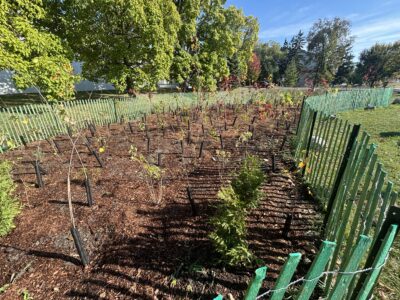
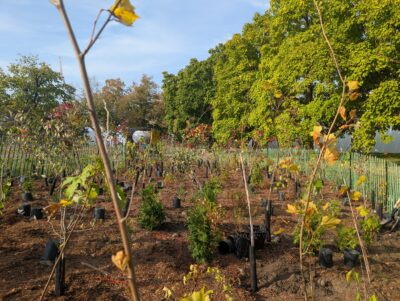
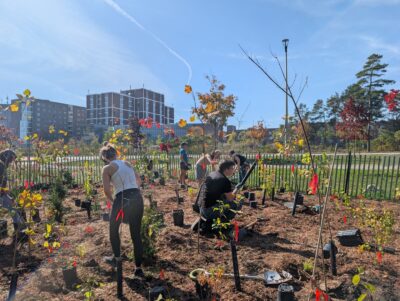
Bird-Friendly Glazing
Carleton is committed to protecting and enhancing biodiversity on its campus. To prevent bird collisions, visual markers (decals) have been applied to the exterior surface of the glass on multiple buildings on campus. It is also now a standard in our design guidelines to incorporate bird-friendly glazing on new construction and major renovation projects involving the exterior of the building.
Current Buildings with Bird-Friendly Glazing
- Engineering Design Centre (EDC) – extension on Mackenzie Building
- Health Sciences Building
- Nicol Building
- Pigiarvik (ᐱᒋᐊᕐᕕᒃ)
- Southam Hall
Carleton has also partnered with SafeWings Ottawa to report bird collisions and work towards campus-wide data and identifying key buildings for additional visual markers. If you observe a bird collision, you can report it through the SafeWings Ottawa website or email Sustainability Carleton with your concerns.
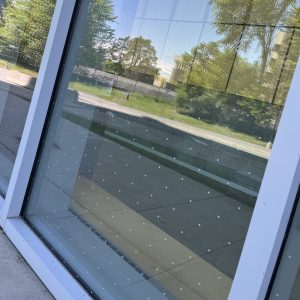
Bird-friendly glazing on Health Sciences, installed in 2018.
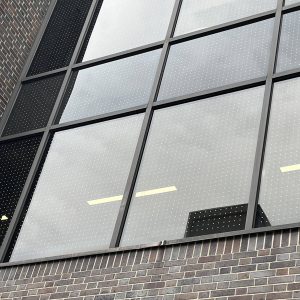
Bird-friendly glazing on Pigiarvik (ᐱᒋᐊᕐᕕᒃ), installed in 2023.
Nature Positive University
In 2022, Carleton joined other universities around the world in a pledge to become Nature Positive. Being a Nature Positive university means “restoring species and ecosystems that have been harmed by the impacts of a university and its activities and enhancing the university’s positive impacts on nature” (Becoming Nature Positive).
As part of our commitment to the Nature Positive Universities program, Carleton is working towards assessing a biodiversity baseline and setting specific, measurable targets towards enhancing biodiversity on campus and becoming Nature Positive. We will also report on our progress annually within our comprehensive sustainability reports, which can be found here.
For more information about the Nature Positive Universities program, click here.
iNaturalist Biodiversity Inventory
Do you want to help play a part in developing Carleton’s biodiversity inventory?
Join our iNaturalist project and submit your observations of species you find on campus.